This review of Grand Illusion, the first numerical Criterion DVD, was written in conjunction with the new 75th-Anniversary print of the film’s engagement at Portland’s historic Cinema 21 theater, starting this Friday, July 6. I got to attend a press showing and was taken aback by how good the new print, which was struck from an original negative, looks today. It’s as if no time has passed at all.
The numerical structure of the review is largely to separate certain sections. Namely, part 1 is a version of the short review that ran in the Portland Mercury. It’s available on their site, alongside a sidebar article I wrote about other films that bear the Renoir influence.
(1) Jean Renoir’s Grand Illusion is 75 years old. Which is70 more years than it took for them to reboot the Spider-Man films. That’s got to say something for how powerful a drama this war movie really is.
Grand Illusion stars Jean Gabin, the French Humphrey Bogart, as a pilot shot down behind German lines during WWI. He is taken to a prison camp where he immediately joins a group of his countrymen in digging a tunnel to escape. Bad luck ends that particular scheme, but not the dream; when Gabin and his effete captain are moved to another prison, this one run by the pilot that knocked them out of the sky (and played impeccably by Erich von Stroheim), the urge to flee becomes undeniable.
There’s a lot of humor and even some heartbreak to be found in the first 2/3 of Grand Illusion. The real meat of the film is in its final reels, however, when Gabin’s flight from incarceration tests his patience with his fellow fugitive and leads to finding love in the countryside. Renoir’s script is both sprawling and devilishly compact. The freewheeling structure keeps it feeling fresh even today. Comments that “the war to end all wars” will do nothing of the sort now seem eerily prescient, as they must have also in 1937, when Hitler was shoring up power. Yet, it’s not what Grand Illusion says about war that keeps it relevant, it’s what it says about the human spirit and the bonds people form in troubling times.
(2) It’s actually interesting to consider how far away from the war the events in the movie are. At the start of the picture, Gabin’s Lieutenant Maréchal is given orders to take Captain de Boeldieu (Pierre Fresnay) on a mission into enemy territory. Jump cut to a very similar scene, with von Stroheim’s stately Captain von Rauffenstein returning from a sortie of his own. I am sure the confusion the sudden change causes is intentional. It takes a couple of lines of dialogue to realize these aren’t the same pilots we saw just seconds ago. In fact, von Rauffenstein is returning from shooting Maréchal and de Boeldieu down. The mission is over, it happened offscreen.
A lot of the action does, at least until the men are finally on the run. There’s another escapee who is killed at the first prison camp, but the shots are fired out of sight. Likewise, when Maréchal is thrown in solitary confinement, we see the instigating action that gets him punished, but not the beatdown. There are also tales of other escape attempts that occurred in between that first prison and ending up at von Rauffenstein’s castle. The German’s have commandeered a 12th-century estate to use as their holding pen. von Rauffenstein has experienced his own comedown in the year or so since he first met the French soldiers. A combat accident has left him with burns all over his body, and he looks like a gothic grotesquerie in his plastic truss. His head practically looks disconnected from his body, placed in the cup of the unyielding girdle. These are all important things that occur, but all of them happen away from the camera eye.
von Rauffenstein’s relationship with de Boeldieu is one of the more crucial in the film, and it gets to the heart of what Renoir and co-writer Charles Spaak are saying about the strange bedfellows wars make. There is a pronounced civility between the fighting men when on the ground. Just because their countrymen are duking it out elsewhere doesn’t mean they can’t get along when guns aren’t blazing. The German Captain sees a comrade in the French Captain. In a way, rank equals class. Yet, there is also a marked difference between de Boeldieu’s aristocratic air and the more friendly Rosenthal (Marcel Dalio), a Jewish immigrant whose family amassed a fortune in France. He didn’t need to fight, but his patriotism extends to protecting the country that blessed him with riches. The major split between von Rauffenstein and de Boeldieu is caused by the German officer’s anti-Semitism and his dismissal of the working-class Maréchal as something lesser.
The action becomes more immediate, and visible, when Maréchal and Rosenthal finally break out, following a plan created by de Boeldieu as atonement for his privilege. We see the men at work, we see them running and hiding, the peril becomes urgent and real. And yet, here too life has a habit of continuing unabated. Eventually Maréchal and Rosenthal hole up in an out-of-the-way farmhouse where a German widow (Dita Parlo, L’Atalante [review]) lives alone with her daughter, having lost all her male relatives to the conflict. She and Maréchal find some comfort and romance with each other, and the unit operates as a temporary family. The regular needs of regular people don’t stop because bureaucrats far away are squabbling over lines on a map.
(3) Jean Renoir, assistant director Jacques Becker (who later made his own masterful prison-break picture, Le Trou), and director of photography Christian Matras (who also shot Le Plaisir [review], Fanfan la Tulipe [review], and The Milky Way [review], among others) carefully balance the intimate and the massive, turning the two elements on their heads and contrasting the difference between confinement and freedom. There is something more secure about the closed spaces. It’s friendly there. Not just with your fellow prisoners, but no one is shooting at you. You know where you are and the boundaries that accompany it.
On the other hand, when Maréchal and Rosenthal are racing across the snowy countryside, they are subject to the elements, dogged by their jailers, and generally uncertain about their future. It’s the irony of freedom. You can do as you please, but there are unpredictable consequences to your actions. Gabin has a natural confidence on camera, but part of the appeal of Grand Illusion is watching this charismatic actor unravel, seeing him lose his cool, watching him take a chance. The unseen escape attempts are treated like a joke--he disguised himself as a guard in one; in another, he dressed in drag, only to be hit on by a non-commissioned officer--but this last shot at liberty is seriously dangerous.
Funny enough, it had been so long since I had seen Grand Illusion, I remembered the ending going a certain way. I e-mailed a friend and said so, and he asked me if this time it turned out that the pair escaped. This is a big question. Did they or didn’t they? What are we supposed to take away from the final shots: that the grand illusion of the title is our belief that there is any safety or security out there? The men note that even if they get home, their most likely fate will be to be sent to the front yet again. They’ll keep going until they win or don’t come back. Regardless of how you interpret the end, the futility of human endeavor seems obvious. Maréchal and Rosenthal are oblivious to how close they came to meeting their deaths, trudging blindly up a hill to who knows where. The folly of man is that we keep climbing, because to stop seems even more pointless. Or so we kid ourselves, carrying on and on in an endless cycle.
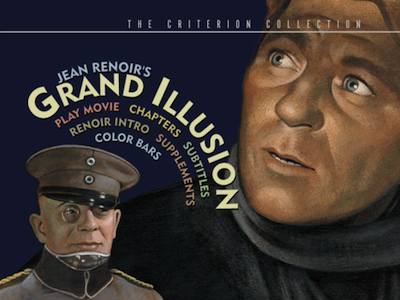
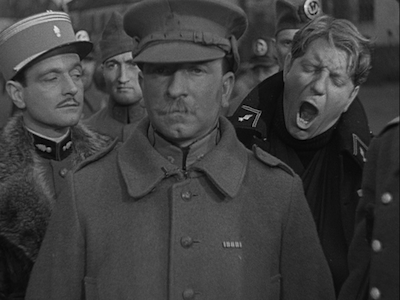
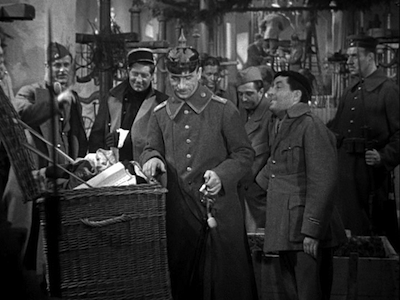
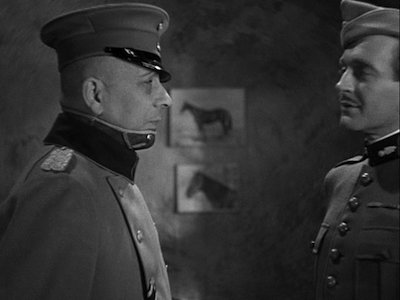

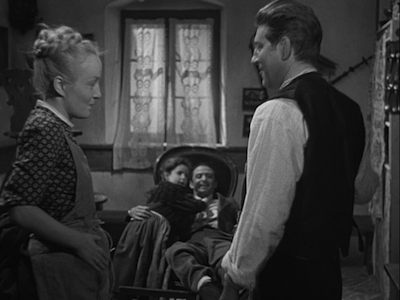
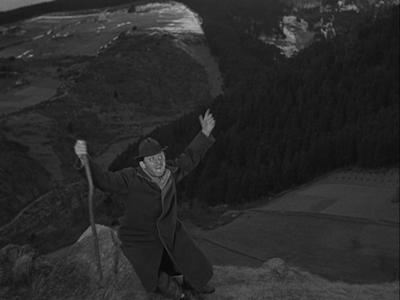




No comments:
Post a Comment